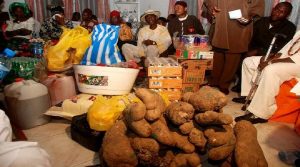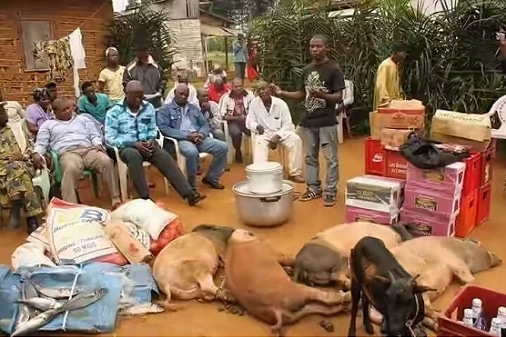Traditional Wedding In The Northern Region Now. Marriage ceremonies among most ethnic groups in the Northern and Upper Regions of Ghana seem to be the same. When a man wants a wife, he starts giving the girl gifts.
The gifts are usually in the form of money, handkerchiefs, towels, etc. If she accepts the gifts, then they become lovers.
Occasionally, the man presents gifts to the girl’s family, especially the mother. The gifts usually differ from community to community. They can be yams, meat, cola, tobacco, drinks, and sometimes money.
Sometimes, items like leather bags, calabashes, and combs are given. These gifts could be given out on behalf of the man by a relative. The presentation of the gifts is to make the girl’s family recognize the man as a would-be son-in-law. Among the Gonja, the man can provide the girl with yams from his farm and meat from his traps while they are still lovers.
When the man is ready to perform the marriage rites, he informs the girl’s parents and a day is fixed for the ceremony. On that day, the man’s father sends the bride price. In some communities, kola nuts and money would be sent to the girl’s parents. She is then called and asked three times whether she likes to marry the man.
If she agrees, then, the kola nuts are distributed among those present. Each of them takes a bite to show their approval. The money is shared among members of the girl’s family. The sharing of the money indicates that they are all witnesses to the marriage ceremony.

Among some communities such as the Frafra, Mamprusi, Dagomba, and Kusasi, the bridegroom pays a bride price with cows. The number of cows is determined by the community. The man has to give that number before the girl becomes the “proper” wife.
A day is fixed for the bride to go to her husband’s house. In some communities like the Sisala, the bride is accompanied by a sister who stays with her for a few months. The Gonja make such fun of the taking away of the girl because on this day, a group of youth pretend to seize the girl. The girl should struggle and weep to show that she does not want to leave her people.
When she is taken to the husband’s house, she is given to an elderly woman who takes care of her for seven days. She is, however, visited by her husband and his friends. During this period, she is shown the husband’s farm and all the things he owns. She is not given her own place such as a kitchen, until the husband’s parents are sure she can stay with them.

Comments are closed.